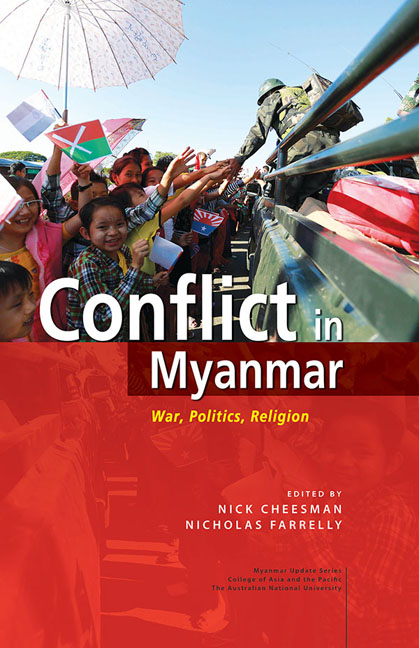Book contents
- Frontmatter
- Contents
- List of Maps
- List of Tables
- List of Figures
- Acknowledgements
- Contributors and Editors
- Part I Introduction
- Part II War and Order
- Part III Elections and After
- 7 The 2015 elections and conflict dynamics in Myanmar
- 8 Institutions in Myanmar's 2015 election: The election commission, international agencies, and the military
- 9 Ethnicity and Buddhist nationalism in the 2015 Rakhine State election results
- 10 The Hluttaw and conflicts in Myanmar
- 11 Legislating reform? Law and conflict in Myanmar
- Part IV Us and Them
- Part V Conclusion
- Abbreviations and Key Terms
- Index
8 - Institutions in Myanmar's 2015 election: The election commission, international agencies, and the military
from Part III - Elections and After
Published online by Cambridge University Press: 22 July 2017
- Frontmatter
- Contents
- List of Maps
- List of Tables
- List of Figures
- Acknowledgements
- Contributors and Editors
- Part I Introduction
- Part II War and Order
- Part III Elections and After
- 7 The 2015 elections and conflict dynamics in Myanmar
- 8 Institutions in Myanmar's 2015 election: The election commission, international agencies, and the military
- 9 Ethnicity and Buddhist nationalism in the 2015 Rakhine State election results
- 10 The Hluttaw and conflicts in Myanmar
- 11 Legislating reform? Law and conflict in Myanmar
- Part IV Us and Them
- Part V Conclusion
- Abbreviations and Key Terms
- Index
Summary
Myanmar successfully held an historic general election on 8 November 2015 under President U Thein Sein's government. Local people as well as the international community welcomed the election outcome, where the National League for Democracy (NLD) won by a landslide, with 77.1 per cent of seats nationwide. The ruling Union Solidarity and Development Party (USDP) won only 117 seats out of 1,150, or 10.2 per cent of the total.
In the pre-election period, some people assumed the election would not be free and fair. Even though by -elections had been held successfully on 1 April 2012 and had brought members of the NLD to parliament, they pointed to general mistrust of the Union Election Commission (UEC), as well as to the removal of the Speaker of the Legislature Thura U Shwe Mann as a member of the USDP Executive Committee by a so-called internal party coup. Furthermore, Myanmar was hit hard by heavy rain and flooding between July and August 2015, which led to speculation that the election might not be held, or might be conducted improperly. Nevertheless, when it was conducted, it attracted praise from home and abroad.
The success of the 2015 election was in part due to the respective roles played by certain key institutions. This paper will concentrate on the roles of the UEC, international agencies, and the military, or Tatmadaw. Today, electoral commissions are integral to conducting democratic elections, and in Myanmar too, the role of the newly created UEC was essential to the success of the 2015 election. In countries like Myanmar without a strong tradition of regular elections, international agencies are an important enabling factor in conducting a successful election. In the case of Myanmar, 2015 was the first time the government opened the door to international observer missions and capacity-building organizations, which contributed in important ways to the election outcome. Lastly, the election could not be held successfully without the complaisance of the Tatmadaw, which has a record of having played an obstructionist or spoiling role. Although questions remain about the role of the military in the post-election power transition and in the work of the forthcoming legislature, it was true to its word in allowing the 2015 election to proceed smoothly, and in remaining committed to the process for the transfer of power to a new government despite the NLD's overwhelming victory.
- Type
- Chapter
- Information
- Conflict in MyanmarWar, Politics, Religion, pp. 163 - 176Publisher: ISEAS–Yusof Ishak InstitutePrint publication year: 2016



